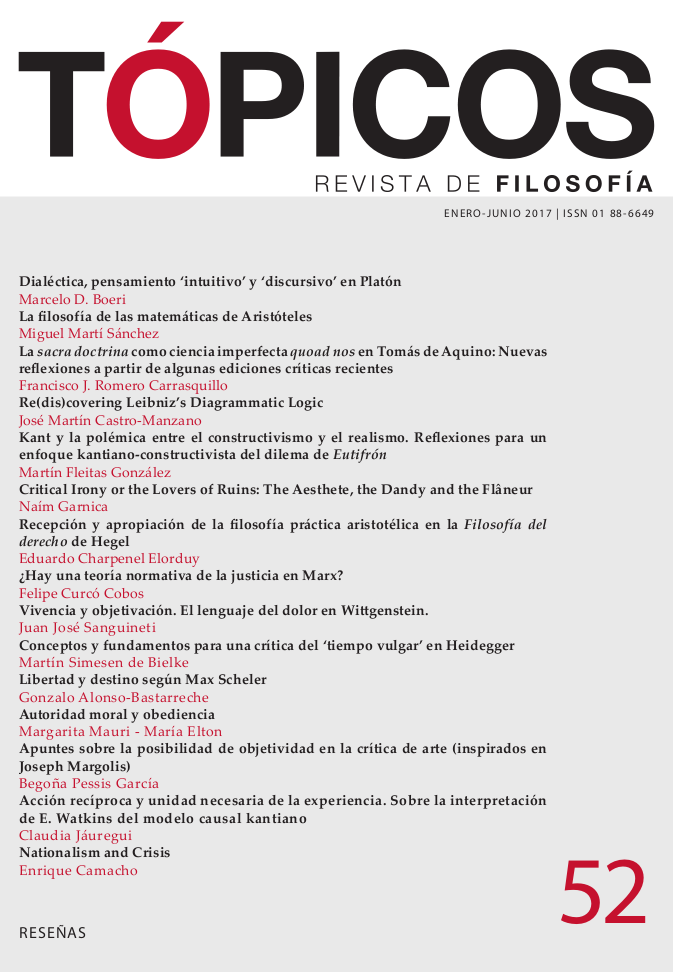Publicado 2016-12-27
Palabras clave
- Platón,
- pensamiento intuitivo,
- pensamiento discursivo,
- certeza epistémica
Cómo citar
Resumen
El propósito de este ensayo es presentar una interpretación deflacionaria de la línea dividida en República VI-VII. Argumento que una parte importante de las dificultades existentes entre la διάνοια y la νόησις radica en el hecho de que se leen las diferentes secciones de la línea dividida como si fueran compartimientos cerrados. Mi afirmación es que uno de los problemas cruciales y de difícil solución es cómo entender que un alma que opere según la νόησις pueda llevar a cabo sus actividades cognitivas prescindiendo completamente de cualquier ingrediente sensible, toda vez que el alma que procede “noéticamente” (νόησις) está en un cuerpo. Para intentar explicar este importante detalle utilizo un pasaje del Fedón, en el que Platón intenta mostrar que es posible desentenderse del cuerpo “en la medida de lo posible”. La tesis de que el alma va ganando “claridad” a medida que va ascendiendo desde la εἰκασία hasta la νόησις, sostengo, podría entenderse como “certeza”: como algunos epistemólogos contemporáneos, Platón parece haber visualizado la idea de que, si hay conocimiento, tal conocimiento debe ser cierto, y tal certeza, sugiero, no se entiende como una mera certeza ‘psicológica’, sino como una certeza ‘epistémica’. Es decir, las razones que el sujeto cognoscente platónico posee son lo suficientemente fuertes como para creer que lo que cree es verdadero.
Referencias
- Adam, J. (1921). The Republic of Plato (Edited with critical notes, commentary and appendices). Cambridge: Cambridge University Press, vol. II (reprinted).
- Aportone, A. (2002). Tra sensazione ed esperienza. Un’introduzione alla concezione kantiana dell’intuizione empirica. En Aportone, A., Aronadio, F., Spinicci, P. (eds.) Il problema dell’intuizione. Tre studi su Platone, Kant, Husserl. (63-157). Napoli: Bibliopolis.
- Aronadio, F. (2002). Il problema dell’intuizione in Platone. En Aportone, A., Aronadio, F., Spinicci, P. (eds.) Il problema dell’intuizione. Tre studi su Platone, Kant, Husserl. (21-61). Napoli: Bibliopolis.
- Audi, R. (1998). Epistemology. A contemporary introduction to the theory of knowledge. London & New York: Routledge.
- ____ (1993). The Structure of Justification. Cambridge: Cambridge University Press.
- Benson, H. (2013). The Priority of Definition. En J. Bussanich & N.D. Smith (eds.) The Bloomsbury Companion to Socrates. (136-155). London- New Dehli-New York-Sydney: Bloomsbury Academic.
- Boeri, M.D. (2016). Theaetetus and Protarchus: two philosophical characters or what a philosophical soul should do. En Cornelli, G. (ed.) Plato’s Styles and Characters. (357-378). Hildescheim-Zürich- New York: Georg Olms.
- ____ (2007). Apariencia y realidad en el pensamiento griego. Investigaciones sobre aspectos epistemológicos, éticos y de teoría de la acción de algunas teorías morales de la antigüedad. Buenos Aires: Colihue.
- Bluck, R.S. (1956). Logos and Forms in Plato: A Reply to Professor Cross. En Mind (New Series) vol. 65, No 260, 522-529.
- Centrone, B. (2008). Platone, Sofista. A cura di Bruno Centrone. Torino: Einaudi.
- Cherniss, H. (1936). The Philosophical Economy of the Theory of Ideas. En The American Journal of Philology, Vol. 57, No. 4, 445-456.
- Cordero, N.L. (1993). Plato. Le Sophiste. Cordero, N. L. (trad.) Paris: GF- Flammarion.
- Cross, R.C. (1954). Logos and Forms in Plato. En Mind (New Series) vol. 63, No 252, 433-450.
- Delcomminette, S. (2006). Le Philèbe de Platon. Introduction à l’ agathologie platonicienne. Leiden-Boston: Brill.
- Dorter, K. (2006). The Transformation of Plato’s Republic. Lanhan-Boulder- New York-Toronto-Oxford: Lexington Books.
- Dretske, F. (1971). Conclusive Reasons. En Australasian Journal of Philosophy, 49, p. 1-22.
- Fattal, M. (2001). Logos, pensé et vérité dans la philosophie grecque. Paris: Harmattan.
- Fine, G. (2004). Knowledge and Belief in Republic V. En Fine, G. Plato on Knowledge and Forms. Selected Essays. (66-84). Oxford: Clarendon Press. (Knowledge and Belief in Republic V. En Archiv für Geschichte der Philosophie, 60, 1978, 121-139. Cito por la edición de 2004).
- Fronterotta, F. (2011). ὑποθέσις e διαλέγεσθαι. Metodo ipotetico e metodo dialettico in Platone. En Longo, A. (ed.) Argument from Hypothesis in Ancient Philosophy. (43-74). Napoli: Bibliopolis.
- ____ (2007). Platone. Sofista (a cura di Francesco Fronterotta). Milano: Rizzoli.
- ____ (2001). METHEXIS. La teoria platonica delle idee e la partecipazione delle cose empiriche (Dai dialoghi giovanili al Parmenide). Pisa: Scuola normale superiore.
- Gonzalez, F. J. (1996). Propositions or Objects? A Critique of Gail Fine on Knowledge and Belief in Republic V. En Phronesis, Vol. 41, No. 3, 245-275.
- Lafrance, Y. (1981). La théorie platonicienne de la Doxa. Montreal-Paris: Les Belles Lettres.
- Murachco, H.-J. Trindade Santos, J. (2011). Platâo. O Sofista. Lisboa: Calouste Gulbenkian.
- Schleiermacher, F. (1970). Theaitetos. Der Sophist. Der Staatsmann (bearb. v. Peter Staudacher, griech. Text v. Auguste Diès, dt. Übers. v. Friedrich Schleiermacher) Darmstadt.
- Slings, S.R. (2003). Platonis Rempvblicam. Recognovit breviqve adnotatione critica instruxit. Oxford: OCT.
- Smith, N.D. (1996). Plato’s Divided Line. En Ancient Philosophy 16, p. 25-46.
- Tordesillas, A. (2016). Le beau, une nature merveilleuse, une vision soudaine (Banquet 210 E2-211D1). En Tulli, M.-Erler, M. (eds.) Proceedings of the X Symposium Platonicum. The Symposium. (315-320). Sankt Augustin: Academia Verlag.
- Trabattoni, F. (2003). Il sapere del filosofo. En Vegetti, M. Platone. La Repubblica (vol. V). (157-163). Napoli: Bibliopolis.
- ____ (1994). Scrivere nell’ anima: verità, dialettica e persuasione in Platone. Firenze: La Nuova Italia.
- Vegetti, M. (2003). Quindici lezioni su Platone. Torino: Einaudi.






